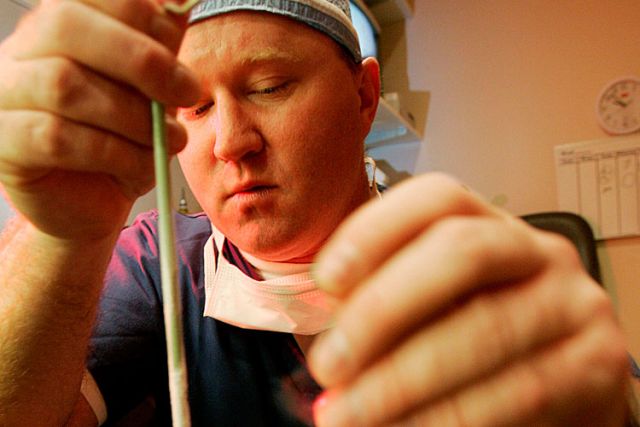Earlier this month Dr. Mats Brannstrom, the chair of the obstetrics and gynecology department at the University of Gothenburg, announced that nine womb transplants performed last September were successful. Doctors transplanted wombs from a living relative into women of child-bearing age who were born without a uterus or had it removed for medical reasons. The next step in this major experiment is for the women to become pregnant.
The pioneering surgery, which potentially could replace surrogate mothers, offers new hope for thousands of childless women but it is raising ethical and moral questions within the context of Church teaching that affect both recipient and donor. For the recipient the issues concern how a child will ultimately be conceived. For the donor the issues relate to Church teaching on procreation.
Moira McQueen, executive director of the Canadian Catholic Bioethics Institute, understands why the procedure is cause for excitement for some. It gives infertile women an opportunity to carry and give birth to their own biological child.
“If you’ve ever talked to women who are having problems with fertility you know the length people will go to become pregnant,” said McQueen, a mother of seven.
Still, as a Catholic ethicist, she has concerns about what is happening in Sweden. Unlike other countries such as Britain and Turkey that have experimented with womb transplants from dead or dying people, Swedish doctors are using live donors.
McQueen doesn’t oppose women receiving a transplanted womb, although she said some ethical questions could arise for the donors. For recipients, the issue is that the only way for a woman with a transplanted womb to become pregnant at this time is through in vitro fertilization (IVF), a procedure regarded as immoral by the Church.
Doctors have yet to perfect the transplant procedure to the point where a woman’s fallopian tubes can be connected to the uterus to allow her to become pregnant naturally. Also, these womb transplants are, for now, intended to be temporary. Those receiving a transplanted uterus must remain on anti-rejection drugs until the womb is surgically removed, which is expected to happen after the first or second birthing.
“In Catholic teaching the use of in vitro fertilization is definitely wrong,” McQueen said. “It shows that they are not being born through an act that involves procreativity and unity. So from that perspective the Catholic Church is saying that it (womb transplant) is not a good idea.” McQueen was quick to note that the Church would not reject children conceived this way, but simply condemns using IVF to create a human embryo.
“The Church is very careful to say to people who have had a child that way, that the child is equal in dignity and human worth just the same as the rest of us,” she said. “It is not about the child as such, it is about the way in which the child is brought into the world. It is the means that are used and in Catholic teaching any means to bring about a child that don’t respect the principle of inseparability and procreativity, that is where we say it is wrong.”
Fr. Tom Lynch, professor of theology at St. Augustine’s Seminary in Toronto and president of Priests for Life Canada, echoed McQueen’s concerns about the IVF component of the process.
“Although there is a lot of continuing controversy around all of these various means of artificially assisted reproduction, which can continue to change and develop, the essence of it is if one is engaged in it, the Church still sees it as immoral in that it breaks the natural bond between a husband and wife,” Lynch said.
“The Church has always taught that both the unity — the sexual intercourse and coming together of the husband and wife — and the procreative or the reproductive shouldn’t be separated.”
That would apply to both the recipient and the donor in the case of a womb transplant from a live donor. By giving up their womb a donor would in effect undergo sterilization, an act the Church regards as intrinsically immoral if, as an ends or a means, it hinders procreation, although that teaching has never been applied in the context of womb transplants.
“The problems come in if it is seen as a sterilization versus a gift,” Lynch said. “The Church hasn’t looked very approvingly on people that will carry a child for another woman as a gift . . . so I doubt that we would see the donation of a uterus as an appropriate gift.”
Generally, the Church regards organ transplants as morally acceptable and, indeed, encourages this practice even for live donations of such organs as livers and kidneys when the surgery poses no excessive risk to the donor. In the case of womb transplants, the Church might be supportive if the organ came from a deceased donor.
“From a cadaver there wouldn’t be those ethical problems,” said Lynch. “It would be very problematic from a live donor unless that donor had other problems where the uterus couldn’t be used. (But) because there are continuing difficulties with a live donor — other than someone who is categorically unable to conceive children — I think that it will be seen as problematic and not allowed.”
Lynch said that if the procedure was perfected so that a woman could conceive naturally following a womb transplant from a deceased donor, then there should be no opposition from the Church. Yet Lynch still believes it is necessary to proceed with caution.
“As Pius XII said many, many decades ago, you’ve got to be very, very careful not to turn the bedroom into a laboratory,” said Lynch.


